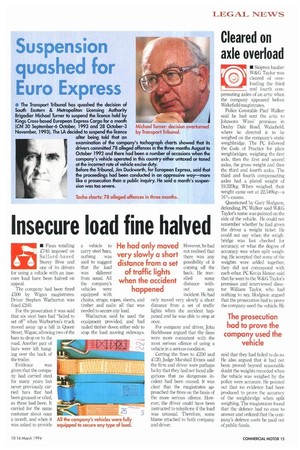Cleared on axle overload
Page 17

If you've noticed an error in this article please click here to report it so we can fix it.
• Skipton haulier W&G Taylor was cleared of overloading the third and fourth compensating axles of an artic when the company appeared before Wakefield magistrates.
Police Constable Paul Walker said he had sent the artie to Johnsons Wires' premises in Denby Dale Road, Wakefield, where he directed it to be weighed on the company's static weighbridge. The PC followed the Code of Practice for plate weighbridges. weighing the first axle, then the first and second axles, the gross weight and then the third and fourth axles. The third and fourth compensating axles had a plated weight of 19,320kg. When weighed, their weight came out at 22,549kg—a 16% excess.
Questioned by Gary Hodgson, defending, PC Walker said W&G Taylor's name was painted on the side of the vehicle. He could not remember whether he had given the driver a weight ticket. He could not say when the weighbridge was last checked for accuracy, or what the degree of accuracy was when split weighing. He accepted that some of the weights were added together; they did not correspond with each other. PC Kevin Moxon said that he went to the W&G Taylor's premises and interviewed director William Taylor, who had nothing to say. Hodgson argued that the prosecution had to prove the company used the vehicle. He
said that they had failed to do so. He also argued that it had not been proved beyond reasonable doubt the weights recorded when the vehicle was weighed by the police were accurate. He pointed out that no evidence had been produced to prove the accuracy of the weighbridge when split weighing. The magistrates found that the defence had no case to answer and ordered that the company's defence costs be paid out of public funds.




















































































